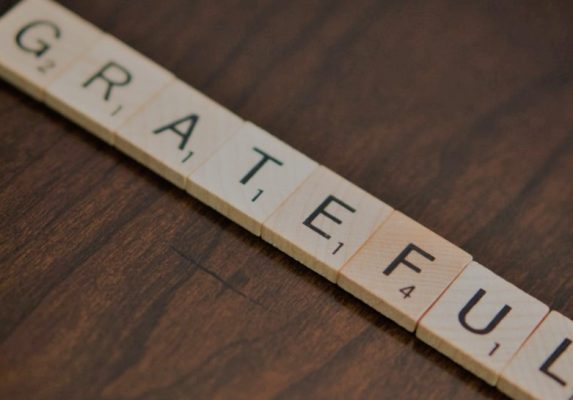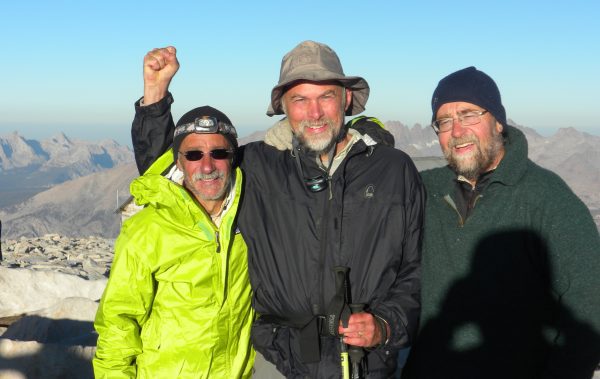The power of a gratitude journal.
Did you know it can reduce stress at work?
Yep. And there is plenty of science to prove it.

I just finished reading Maria Shiver’s book, I’ve Been Thinking… Reflections, Prayers, and Meditations for a Meaningful Life, a wonderfully uplifting book to read in these trying times. One of her many recommendations is keeping a gratitude journal and beginning each day by reflecting on all the things you are grateful for. (Read my book review of it here).
In the Greater Good Magazine, Robert Emmons explains that a gratitude journal can help you:
- be more stress resistant
- block toxic, negative emotions
- sleep better
- and celebrate the ‘present’ (i.e. be more mindful . . . see 3 Reasons to Practice Mindfulness at Work.)
Other research from the Science of Happiness online class I took a few years ago speaks to the fact that emotionally healthy people exhibit a ratio of “negative thoughts” to “positive thoughts”. I can’t find the exact number but it is something like 3:1 ratio. By writing a gratitude journal you counteract negative thoughts with positive ones...and then reap the benefits of positivity. The gratitude journal focuses your thinking on positive thoughts and actually reduces the number of negative words you write and think about.
In Shawn Achor’s Ted Talk, The Happy Secret to Better Work (very funny as well as enlightening), his research also supports all the same outcomes as Robert Emmons work above. One interesting piece of research he did on writing a gratitude journal was that in just 2 minutes/day for 21 days you can train your brain to scan for the positive. I think that is amazing!
I am a prolific networker and collaborator and see so many people who are stressed at work. It truly saddens me because I remember when I was unhappy at work, feeling unappreciated, with unrealistic expectations, and not enough support. I started a gratitude journal and each night I wrote 5 things down I was grateful for. The first few nights were fairly easy with family, friends, leading the list. Then I had to dig a little deeper into what I was grateful for. Coworker stepped up to help me at work. It was a beautiful day. A driver was very nice and let me in at an intersection. It does not have to be big things. Literally anything positive.
After two weeks of writing in my gratitude journal, I was amazed at how much all those people at work had changed! They were not as “bad” to me. Work was better. Not fixed. Not perfect. But clearly better.
So what happened? They obviously did not change. I had changed my attitude. I noticed the positive things going on more and spent less time and energy on the negatives. There was a direct correlation to writing a gratitude journal every evening before I went to bed. It also helped me sleep better (which was a contributor to my negativity).
A gratitude journal can help with your perception of the ‘vortex of negativity’.
I call it the ‘vortex of negativity’. One negative builds on another negative and pretty soon all you see and feel is the negativity all around you. Try a gratitude journal and let me know how it goes.
Here is a snippet from my gratitude journal today.

I am grateful for:
- close family members, my brothers, and sister
- my wife who loves me
- my 92-year-old dad who continues to amaze me
- my three sons who are all doing well
- my ability to stay active through exercise, hiking, fishing, playing hockey
- my friends who all bring something special into my life
What are you grateful for?
Start your gratitude journal today and let me know how it works for you.
————————————
Check out this INTERVIEW on Stress in the Workplace with Dr. Jeri Stevens.
Read other blogs on this topic of Mindfulness.
Jim Peacock is the Principal at Peak-Careers Consulting and writes a weekly email for career practitioners. Peak-Careers offers discussion-based online seminars for career practitioners focused on meeting continuing education needs for CCSP, GCDF and BCC certified professionals as well as workshops for career practitioners and individual career coaching.
He is the author of A Field Guide for Career Practitioners: Helping Your Clients Create Their Next Move and the recipient of the 2020 Kenneth C. Hoyt Award from the National Career Development Association.
Sign up here to receive my TOP 10 TIPS WHEN WORKING WITH AN UNDECIDED PERSON. You will also receive the career practitioner’s weekly email on a variety of career topics, industry news, interesting events, and more.



Leave a Reply